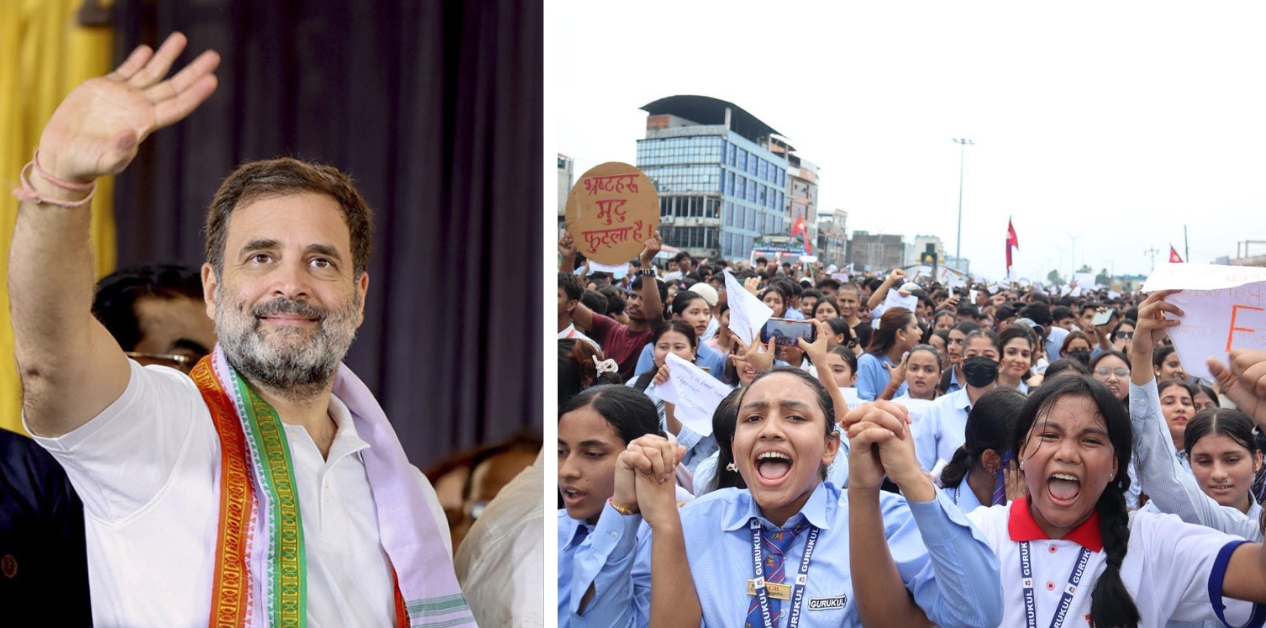

KATHMANDU: “The country’s youth, the country’s students, the country’s Gen Z will save the constitution, protect democracy, and stop vote-stealing. I am always with them.”
On September 18, the leader of the major opposition party in the Indian Parliament, Indian National Congress’s Rahul Gandhi, wrote on social media X, linking it to Nepal’s Gen Z movement. Following this, he was drawn into controversy.
Prime Minister Narendra Modi, who has been in power for the last 13 years, as well as the President of the ruling Bharatiya Janata Party (BJP), JP Nadda, and ministers like Ravi Shankar Prasad and Giriraj Singh, have been giving sharp reactions against Rahul.
Indian National Congress has been attributing its electoral defeats to vote-stealing through EVMs. Thus, while the student union elections were ongoing at Delhi University, Rahul also appealed to the Gen Z to raise the issue of vote-stealing in his press conference.
Less than six days after Rahul’s post on X, a Gen Z movement took place in Indian-administered Ladakh. Four people lost their lives in a single day during the protests. The cause of the movement was attributed to the famous environmental activist of Ladakh, Sonam Wangchuk, and he was arrested. He is currently in jail. The organizations and companies he is associated with have been accused of financial misappropriation.
Critics are not willing to consider the large-scale movement in Ladakh following Rahul’s single call as merely a coincidence.
The escalating protests in Ladakh have been viewed in connection with the Gen Z movement in Nepal. There was a time when Delhi practiced ‘micro-management’ in Kathmandu. That trend continues even now. However, the way the recent youth movement in Nepal is transferring its heat to India is starting to give the ruling BJP government a headache.
The Gen Z movement in Kathmandu on September 8 and 9 and the incident in Ladakh, considered strategically important and sensitive for India, have sent ripples through Indian politics.
Along with Ladakh, the ‘I love Mohammad’ trend being run by the Muslim community on social media is not without its effect on Indian politics.
The 55-year-old Rahul is not enthusiastic for no reason, as the wave of Gen Z rebellion has shaken Indonesia, the Philippines, Japan, Sri Lanka, Bangladesh, Nepal, and even France. He now sees Gen Z as the only basis for his return to power.
Rahul has more than 28 million followers on X. In response to his post, BJP MP and actress Kangana Ranaut, elected from Himachal, wrote, “He doesn’t even know the reason for what is happening in the world.”
Despite Kangana’s sarcasm towards Rahul, Gen Z have already taken to the streets in Ladakh, neighboring her state of Himachal, demanding a separate state.
From the 1980s to the first decade of the 2000s, the Indian National Congress had dominance in Nepali politics. Even though the Gandhi family enjoyed undisputed rule in India during the 80s and 90s, Rahul has not tasted power. Therefore, his current restlessness is not surprising.
There was a time in 1984 when Congress ruled with 415 seats across India. At that time, Modi’s party, the erstwhile Jan Sangh (later BJP), had only two seats. In 2019, when the BJP won 303 seats, Congress, which had to settle for 52 seats, has now lost governance in many states.
In such a situation, will Rahul, enthusiastic about the Nepali Gen Z rebellion, use it as a foundation to bring Indian National Congress back to power in India?